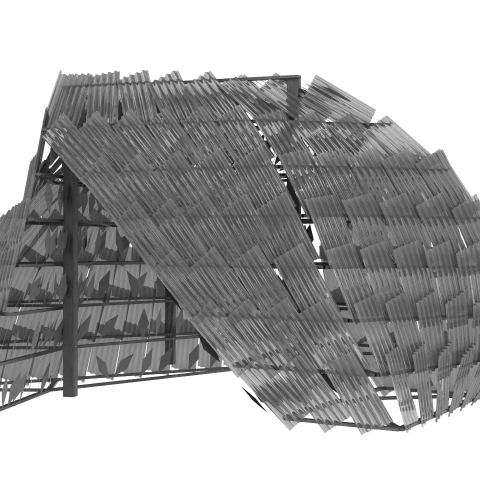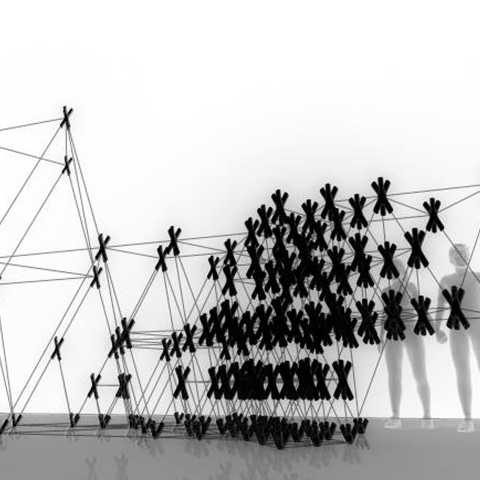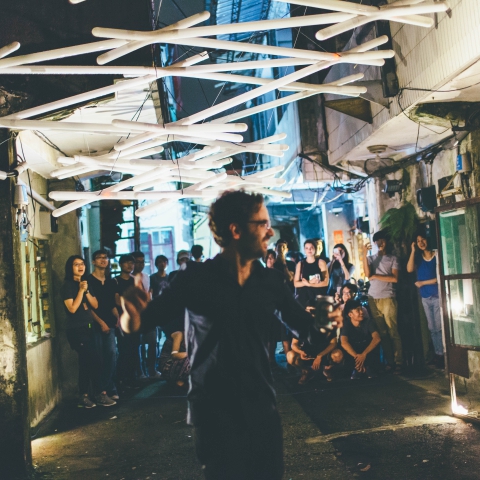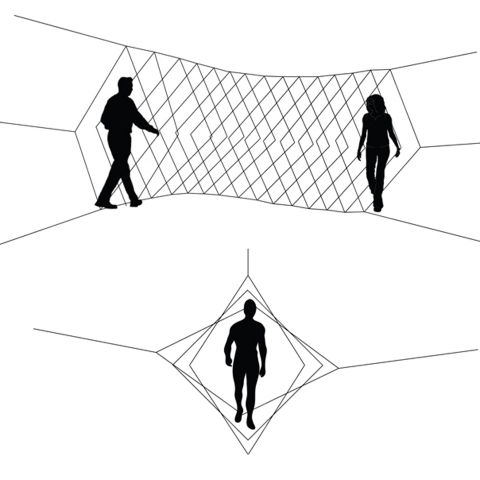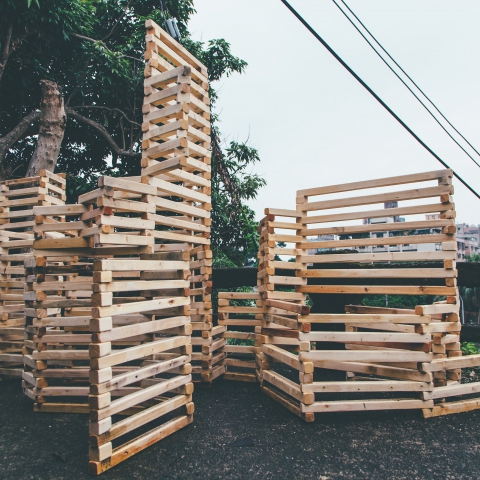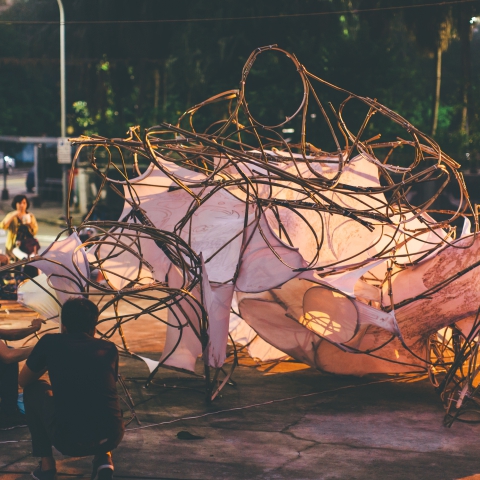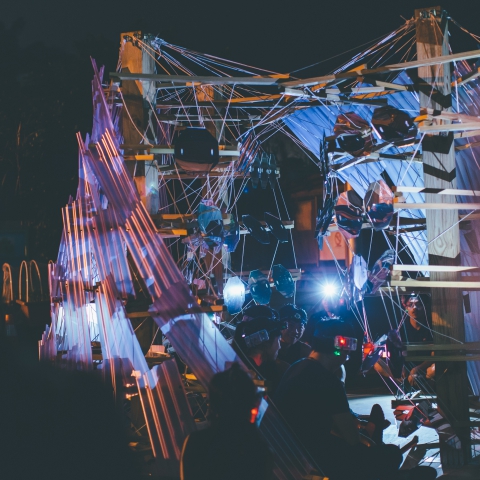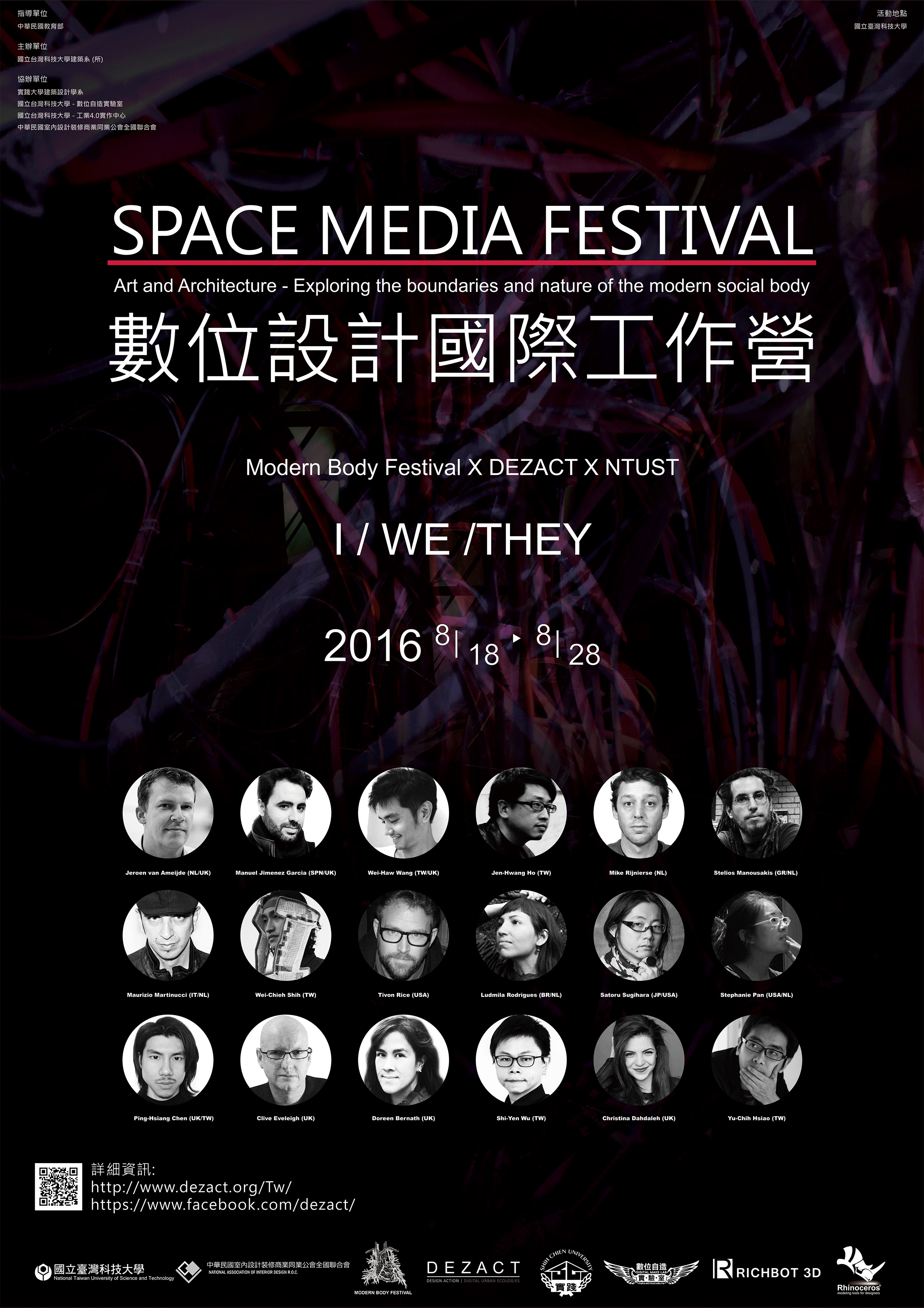
[:en]Festival Organizer : National Taiwan University of Science and Technology, The department of Architecture / Stichting Modulus (NL)
Co-Organizer: Shih Chein University, The department of Architecture Design / National Taiwan University of Science and Technology – Digital Make Lab & 4.0 Industrial Make Lab / National Association of Interior Design [:]
[:Tw]指導單位: 中華民國教育部
主辦單位:國立台灣科技大學建築系 (所) / Stichting Modulus (NL) /
協辦單位:實踐大學建築設計學系 / 國立台灣科技大學 – 數位自造實驗室 / 國立台灣科技大學 – 工業4.0實作中心 / 中華民國室內設計裝修商業同業公會全國聯合會
執行單位:DEZACT (英國) / Stichting Modulus (NL)
協助單位:瑞寶網通股份有限公司 | Rhinoceros | [IN] Morph Lab l MadMDesignsa l ATLV [:]
[:zh]指导单位: 中华民国教育部
主办单位:国立台湾科技大学建筑系 (所) / Stichting Modulus (NL) /
协办单位:实践大学建筑设计学系 / 国立台湾科技大学 – 数位自造实验室 / 国立台湾科技大学 – 工业4.0实作中心 /
中华民国室内设计装修商业同业公会全国联合会
执行单位:DEZACT (英国) / Stichting Modulus (NL)
协助单位:瑞宝网通股份有限公司 | Rhinoceros | [IN] Morph Lab l MadMDesignsa l ATLV [:]
[:en] Synopsis – redefining ‘I / WE / THEY’
The special theme in this pilot trans-context, trans-cultural and trans-disciplinary collaborative programme of 2016 is ‘I / WE / THEY’. This theme is at the core of both the Space Media Festival taking place in Taipei in 18-28 August 2016 and the Modern Body Festival in The Hague in October/November 2016. At the same time, the collaborative and explorative process led by teams of artist-architect will also span across both contexts. The concept of ‘I / WE / THEY’ is thus being subjected to diverse forms of engagement between the body, the space and the medium, as well as being embedded in specific cultural, social, technical and spatiotemporal conditions. We are exploring the effects of architecture, technology and digital communication, as they are fundamentally transforming the way we exist as a society, culture, species. Our focus is on the social body – identity, space, and community: how we interface with I/WE/THEY. Where do the limits of the self extend and where do the social bodies of group and community begin? How do we understand and position ourselves as individuals, while still feeling a sense of belonging and connection to an expanding global community? How do we exist, identify, and interact? Furthermore, we want to explore the role of architecture and technology as central social interfaces between the I and the world, the I and the group, the I and the self. How do they impact our behavior, confront our habits, alter our experience?
Festival Format
For this collaborative edition, we have developed a reciprocal format: a DEZACT/NTUST-led, MBF-infected, 11-day workshop-driven festival in Taiwan, with a final showcase on the last day, and an MBF-led, DEZACT/NTUST-infected, 5-day showcase-driven festival in The Hague, with accompanying workshops (3 days of thematic 1-day workshops and symposia, and 2 days of exhibitions and performances).
[:][:Tw]Space Media Festival 為一跨多領域綜合數位與製造技術之建築與藝術工作營,本次透過對於探索三個不同尺度的空間 I/WE/THEY (自我身體/生活空間/全球環境) 與相對應之文化議題來發展一系列的互動式空間裝置。本次活動之基地為台北的蟾蜍山,透過由五位來自數位設計專業背景的頂尖建築師與五位藝術家進行合作發展 出綜合數位設計、數位製造、新媒材運用、互動媒體及表演藝術的課程內容,其目的在於鼓勵不同領域人才合作並以新科技技術運用作為研究及設計發展的創新手 段,透過結合國際資源整合及跨領域、年齡的課程規劃來啟發學生對於學習及自我興趣發展和跨界合作創新的視野! 適合各領域的學生及專業人士參加!
此橫跨多領域以建築師與藝術家主導的課程將帶領學員從自身出發重新定義及思索以下主題,探索現代關於自身、周遭及全球(I/WE/THEY)的空間性,並以台北及海牙作為文化研究之基地進行如都市機能代謝變遷,社會群體的摩擦互動,人文和自然生態的結合,到訊息交流和人情共識等等層面創新設計製造活動,探索現實狀態的特質及問題。我們將利用廣義的「製造」和「合作」行動來介入和激發都市問題空間的變化和再利用,跨領域結合人文社會活動及多媒體互動,建立專業和非專業之反饋機制,實現實體和虛擬共存體驗。數位設計、先進製造技術及多媒體互動等創新技術進行回應。 活動過程透過多樣的 概念,觀點,數位和媒體工具來剖析和設計,考量到多變的時間性,空間性和功能上的使用,佔用,暫用。設計的產生更進一步探討量化和非量化因素,數位參數模 擬和人的情緒行為,公眾和私人領域分別和認同,歷史記憶和未來展望等等之間的複雜關係。從街道,舊建築,交通,氣候,慶典到社會運動,「介質空間季」交織 建築設計之互動概念和實驗性技術,對於現狀的批判性和想像力,來達到提升城市機能及豐富公眾生活層次和價值。
[:zh]Space Media Festival 为一跨多领域综合数位与制造技术之建筑与艺术工作营,本次透过对于探索三个不同尺度的空间I/WE/THEY (自我身体/生活空间/全球环境) 与相对应之文化议题来发展一系列的互动式空间装置。本次活动之基地为台北的蟾蜍山,透过由五位来自数位设计专业背景的顶尖建筑师与五位艺术家进行合作发展出综合数位设计、数位制造、新媒材运用、互动媒体及表演艺术的课程内容,其目的在于鼓励不同领域人才合作并以新科技技术运用作为研究及设计发展的创新手段,透过结合国际资源整合及跨领域、年龄的课程规划来启发学生对于学习及自我兴趣发展和跨界合作创新的视野! 适合各领域的学生及专业人士参加!
此横跨多领域以建筑师与艺术家主导的课程将带领学员从自身出发重新定义及思索以下主题,探索现代关于自身、周遭及全球(I/WE/THEY)的空间性,并以台北及海牙作为文化研究之基地进行如都市机能代谢变迁,社会群体的摩擦互动,人文和自然生态的结合,到讯息交流和人情共识等等层面创新设计制造活动,探索现实状态的特质及问题。我们将利用广义的「制造」和「合作」行动来介入和激发都市问题空间的变化和再利用,跨领域结合人文社会活动及多媒体互动,建立专业和非专业之反馈机制,实现实体和虚拟共存体验。数位设计、先进制造技术及多媒体互动等创新技术进行回应。活动过程透过多样的 概念,观点,数位和媒体工具来剖析和设计,考量到多变的时间性,空间性和功能上的使用,占用,暂用。设计的产生更进一步探讨量化和非量化因素,数位参数模 拟和人的情绪行为,公众和私人领域分别和认同,历史记忆和未来展望等等之间的复杂关系。从街道,旧建筑,交通,气候,庆典到社会运动,「介质空间季」交织建筑设计之互动概念和实验性技术,对于现状的批判性和想像力,来达到提升城市机能及丰富公众生活层次和价值。
>>>活动手册[:]
[:en]Dezact/NTUST- led Festival Project Agenda
As intended and instigated by both festival organisers, the project brief has been formulated in response to an ongoing dialogue amongst participating artist and architects to unravel some of the most pertinent and polemical interpretation of ‘I / WE / THEY’ to be interrogated in the creative and critical projects:
– the ‘body’ redefined through the dissolution of corporeal boundaries and bio-technical augmentation
– the ‘self’ redefined through displaced, divided, duplicated/multiplied and prosthetic presences
– the ‘other’ redefined through relative, virtual and immersive interfaces
– the ‘space’ redefined through responsive and iterative process enabled by algorithm and agent-based tools
– the ‘public’ redefined through mobility, multilateral communication and distributed urban networks
– the ‘identity’ redefined through behavioural dynamics and telematic relations
and finally, altogether,
– the ‘city’ redefined through new notions of the previous six conceptual categories
We envisage that the creative and critical reinterpretation of ‘I / WE / THEY’ will thus be born through the interrogations of these seven categories by the five pairs of artist-architect while working across both contexts of Taipei and The Hague.
[:][:Tw]研究方向
A. 如何透過化解有形的界限和制式生物成長原理重新定義“身體”
B. 如何透過移動、分裂、複製/加乘與修復的狀態重新定義“自我”
C. 如何透過相對的、虛擬的和身臨其境的介面重新定義“空間”
D. 如何依靠演算法和代理人基工具的運作,在迅速反應與重複的過程中重新定義“空間”。
E. 如何透過流動性、多邊溝通和城市網絡重新定義“公共”
F. 如何透過動態行為和遠程訊息傳遞的關係來重新定義“身份”
G. 如何通過前六項的重新定義的新概念,重新定義“城市”[:]
[:zh]研究方向
A. 如何透过化解有形的界限和制式生物成长原理重新定义“身体”
B. 如何透过移动、分裂、复制/加乘与修复的状态重新定义“自我”
C. 如何透过相对的、虚拟的和身临其境的介面重新定义“空间”
D. 如何依靠演算法和代理人基工具的运作,在迅速反应与重复的过程中重新定义“空间”。
E. 如何透过流动性、多边沟通和城市网络重新定义“公共”
F. 如何透过动态行为和远程讯息传递的关系来重新定义“身份” G. 如何通过前六项的重新定义的新概念,重新定义“城市”[:]
STUDIO 3 – THE WOVEN MEMORY
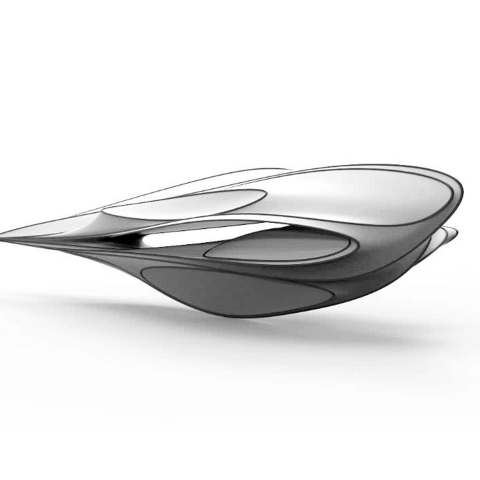
STUDIO 4 – GEM OF LIVES
